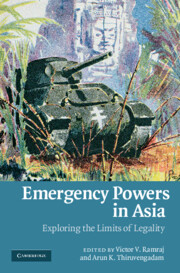Book contents
- Frontmatter
- Contents
- List of contributors
- Preface
- 1 Introduction: emergency powers and constitutionalism in Asia
- PART I Perspectives from legal and political theory
- 2 The emergency powers paradox
- 3 Emergency powers, constitutionalism and legal transplants: the East Asian experience
- 4 Constitution and ‘extraconstitution’: colonial emergency regimes in postcolonial India and Pakistan
- 5 The princely impostor: stories of law and pathology in the exercise of emergency powers
- PART II Postcolonial and post-conflict transitions
- PART III Emergencies, executive power and constitutional order
- PART IV The role of the courts
- Index
- References
5 - The princely impostor: stories of law and pathology in the exercise of emergency powers
from PART I - Perspectives from legal and political theory
Published online by Cambridge University Press: 04 August 2010
- Frontmatter
- Contents
- List of contributors
- Preface
- 1 Introduction: emergency powers and constitutionalism in Asia
- PART I Perspectives from legal and political theory
- 2 The emergency powers paradox
- 3 Emergency powers, constitutionalism and legal transplants: the East Asian experience
- 4 Constitution and ‘extraconstitution’: colonial emergency regimes in postcolonial India and Pakistan
- 5 The princely impostor: stories of law and pathology in the exercise of emergency powers
- PART II Postcolonial and post-conflict transitions
- PART III Emergencies, executive power and constitutional order
- PART IV The role of the courts
- Index
- References
Summary
Introduction
The dominant approach to ‘emergency powers’ in liberal constitutional law is characterised by a preoccupation with how to produce legitimacy in exceptional moments. Reflecting a liberal concern with the abuse of power, the jurisprudential focus is on how to allow exceptions to constitutional order without undermining constitutionalism. In effect, we can understand this as an effort directed at delineating the character of ‘a legitimate prince’ so that sovereign identity is recognisable even in conditions of crisis and, concomitantly, so that we are better positioned to expose, deter and exclude impostors from the throne. The dominant solutions are threefold – better laws, institutions and norms. The field of constitutional law has been devoted in many ways to developing constitutional solutions that better delineate the conditions of its suspension. Thus there are many treatises on how to define and restrict what constitutes the ‘exceptional’ circumstances that can trigger the invocation of emergency powers, raise the threshold on the procedural checks that need to be satisfied for such powers to be passed and then limit the extent of the abrogation of ‘normal’ constitutionalism. Alongside this, there are those who look specifically to the societal internalisation of the norms of rights and democracy that sustain constitutionalism – what some have described as the ‘norm cascade’ that normalises rights expectations by citizens and rights-conforming behavior by states even in exceptional times.
- Type
- Chapter
- Information
- Emergency Powers in AsiaExploring the Limits of Legality, pp. 121 - 146Publisher: Cambridge University PressPrint publication year: 2009
References
- 5
- Cited by



